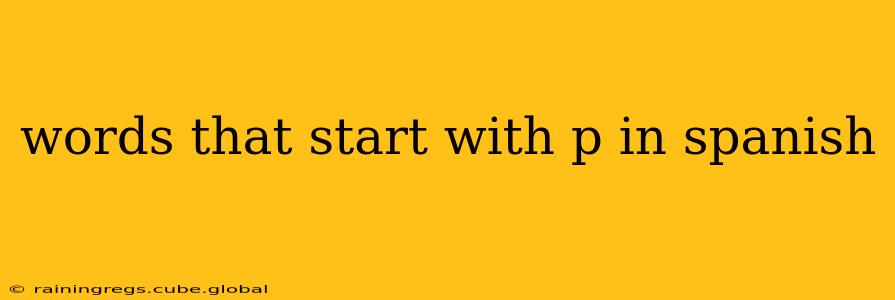Words That Start With "P" in Spanish: A Comprehensive Guide
Learning a new language involves more than just memorizing vocabulary lists. Understanding the nuances of a language, such as the frequency and usage of words beginning with a specific letter, offers a deeper appreciation for its richness and structure. This guide delves into the plethora of Spanish words starting with the letter "P," exploring different categories and offering examples to enhance your vocabulary.
We'll explore words across various parts of speech, from common everyday words to more specialized vocabulary. This will help you not only expand your lexicon but also understand the contexts in which these words are used.
Common Words Starting with "P" in Spanish
Let's start with some of the most frequently used words beginning with "P" in Spanish:
- Para: For, to, in order to (preposition) - Para mí, es importante. (For me, it's important.)
- Pero: But, however (conjunction) - Quiero ir, pero estoy cansado. (I want to go, but I'm tired.)
- Porque: Because (conjunction) - No puedo ir porque estoy ocupado. (I can't go because I'm busy.)
- Poder: To be able to, can (verb) - Puedo ayudarte. (I can help you.)
- Por: By, for, through (preposition) - Lo hice por ti. (I did it for you.)
- Primero: First (adjective/adverb) - Primero, necesito comer. (First, I need to eat.)
- Padre: Father (noun) - Mi padre es médico. (My father is a doctor.)
- Palo: Stick, pole (noun) - Necesitamos un palo para la tienda. (We need a stick for the tent.)
Words Starting with "P" in Spanish: Exploring Different Categories
To further enrich your understanding, let's look at words grouped by category:
Nouns:
- Playa: Beach - Me encanta la playa. (I love the beach.)
- Pan: Bread - Quiero un poco de pan. (I want some bread.)
- Puerta: Door - Cierra la puerta, por favor. (Close the door, please.)
- Pais: Country - ¿De qué país eres? (What country are you from?)
- Peso: Weight, peso (currency) - ¿Cuánto pesa esto? (How much does this weigh?)
Verbs:
- Pensar: To think - Estoy pensando en ti. (I'm thinking of you.)
- Pedir: To ask for, to order - Voy a pedir una cerveza. (I'm going to order a beer.)
- Perder: To lose - No quiero perder mi teléfono. (I don't want to lose my phone.)
- Probar: To try, to taste - ¿Puedo probar esto? (Can I try this?)
Adjectives:
- Pequeño: Small - Tengo un coche pequeño. (I have a small car.)
- Perfecto: Perfect - ¡Perfecto! (Perfect!)
- Posible: Possible - Es posible que llueva. (It's possible that it will rain.)
Frequently Asked Questions (FAQ) about Spanish words starting with "P"
While there isn't a readily available "People Also Ask" section for this specific query on major search engines, here are some questions one might ask related to the topic, along with their answers:
What are some common Spanish words starting with "P" used in everyday conversations?
The words listed in the "Common Words" section above are frequently used in daily conversations. Mastering those will significantly improve your conversational fluency.
Are there any regional variations in the pronunciation or usage of Spanish words starting with "P"?
Yes, slight variations in pronunciation can exist depending on the region. However, the core meaning and usage of the words remain consistent across different Spanish-speaking countries.
How can I effectively learn more Spanish words starting with "P"?
Immersion is key! Read Spanish books and articles, watch Spanish movies and TV shows, and actively participate in conversations with native speakers. Use flashcards, language learning apps, and online resources to reinforce your learning.
This guide provides a starting point for expanding your knowledge of Spanish words that begin with "P." Continuous learning and practice are crucial for mastering any language. Remember to explore further through various resources to deepen your understanding and fluency.
